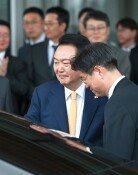As Koreas Elderly Population Grows, So Do Their Demands
As Koreas Elderly Population Grows, So Do Their Demands
Posted October. 07, 2005 07:35,
With Koreas population aging at an unprecedented rate, its silver power is growing as its elderly raise their voices.
The phenomenon is a result of the growing trend of the senior citizens rights movement in which the elders aim to find their rights on their own, departing from the passive attitude of seeing themselves as beneficiaries of welfare policy.
Aggressive Demand for Rights-
The senior citizens association in Pyeonchang-eup, Gangwon Province recently staged a small protest.
The association requested the remodeling of a 130-pyeong association hall in Ha-ri, Pyeongchang-eup into a modern health welfare town, saying that the hall built 20 years ago is too old. After the association launched a signature-seeking campaign, the Pyeongchang-gun authorities promised to positively reflect the opinions of senior citizens on the building of a province culture welfare center scheduled for next year.
The elderly in a town in Ulsan recently proposed that Ulsan City should build another nursing home, saying, Nursing home facilities are concentrated in the city center, and won a positive response.
Collecting opinions from the old, Jeonnam Province raised the allowance for poor old people to 2,000 won per meal from 1,520 won, starting the second half of this year.
Daejeon City announced its plan, titled, Daejeon 2010: Setting an Example for the Welfare of Senior Citizens on October 6. Under the plan, the city will push forward 13 projects, including the expansion of traffic allowance payments for the elderly, securing elderly care managers, building an all-weather gate ball field, and managing an art troupe made up of the elderly by investing 315.4 billion won from next year to 2010.
Active Nationwide Organizations-
With the number of old people rapidly increasing and their demands diversifying, there are growing numbers of organizations and groups representing their voices.
In Ulsan, a labor union which consists of guards aged over 64 years old was formed this June. In Goyang city, Gyeonggi Province, the Silver Times has been published for five years under the slogan, the olds newspaper by the old, for the old.
Apart from the Korea Seniors Association, other nationwide organizations like the Silver Forum 21, the Korea League of Senior Voters, the Korean Information and Referral Service Centre on Ageing, and the Korean Association of Retired Persons, are actively operating.
The sivernews.or.kr, an internet newspaper, has more than 50 elderly journalists in five divisions, including education and culture, welfare, society and health.
The activities of these organizations are not limited to demanding increase in welfare spending on the old. They are aggressively presenting their opinions about senior citizens rights in everyday lives, including introduction of a Silver Zone for the safe crossing of roads and the establishment of regular job fairs for the elderly.
The Korea Society of Welfare for the Aged (KSWA) is planning to organize a massive rally where some 2,000 aged people are expected to participate in late this month in Jongmyo Park in Seoul, and collect various demands from them through a one-minute free speech session.
Lim Chun-sik (56), the chairman of the KSWA and a professor of Hannam University, analyzed, By solidifying joint activities among NGOs for the aged which drive senior citizen rights movements, and by securing capital, the senior population could become the most powerful group in Korean society.
Ki-Jin Lee Chang-Soon Choi doyoce@donga.com cschoi@donga.com







